- Home
- Dan Simmons
The Hollow Man Page 4
The Hollow Man Read online
Page 4
Bremen had no memory of packing the thing. He lifted the pistol, unwrapped the bandanna, knowing that at least he would not have loaded it.
It was loaded. The tips of five slugs were partially visible in the round cradles of their chambers, gray-curved and pregnant with death. Bremen wrapped the pistol, set it in the bag, and zipped the bag shut. He carried it back to the store.
Norm Sr. raised his eyebrows.
“I guess I brought the wrong clothes for fishing,” said Bremen, trying a grin. “I’ll look on the racks over there.”
The man behind the counter nodded.
“And some groceries,” said Bremen. “I’ll need three days’ worth, I guess.”
Norm Sr. walked over to shelves near the front of the store and began removing cans. “The cabin’s got an old stove,” he said. “But most guys just use the hot plate. Soup an’ beans an’ stuff okay?” He seemed to sense that Bremen was not up to making decisions himself.
“Yeah,” said Bremen, finding a pair of work pants and a khaki shirt only one size away from his own. He carried them over to the counter and looked at his feet, frowning at his polished penny loafers. One glance around told him that this miraculous store did not stock boots or sneakers.
Norm Sr. retotaled the bill and Bremen peeled off twenties, thinking that it had been many years since he had been so pleased to make a purchase. Norm Sr. dumped the goods in a cardboard box, cartons of live bait going in next to bread and white-paper-wrapped packages of cold cuts, and handed Bremen the fiberglass rod he’d chosen for him.
“Verge’s got the outboard warmed up. That is, if you’re ready to go on out …”
“I’m ready,” said Bremen.
“You might wanna move your car down from the road. Park it out behind the store.”
Bremen did something that surprised even himself. He handed Norm Sr. the keys, knowing beyond certainty that the car would be safe with the man. “Would you mind …?” Bremen could not conceal his eagerness to get going.
Norm Sr. raised his eyebrows a second, then smiled. “No problem. I’ll do it right away. Keys’ll be here when you’re ready to leave.”
Bremen followed him out the back door, onto a short dock that had been invisible from the front of the store. The old man sat at the rear of a small boat, grinning up toothlessly.
Bremen felt a sort of unhappiness unfold in his chest, rather like a tropical bird stretching its wings after sleep, revealing bright plumage. For a terrible second Bremen was afraid that he might cry.
Norm Sr. handed the carton of goods down to Verge and waited while Bremen clumsily stepped into the center of the boat, laying his fiberglass rod carefully along the thwarts.
Norm Sr. tugged at his nylon cap. “You all have a good time out there, hear?”
“Yes,” whispered Bremen, sitting back on the rough seat and smelling the lake and the bite of motor oil and even the hint of kerosene on his clothes. “Yes. Yes.”
EYES
Probably no one alive understands how the mind actually works as well as Jeremy. Besides having access to other minds since he was thirteen years old, Jeremy has blundered onto research that shows the actual mechanism of thought. Or at least a very good metaphor for it.
It is five years before Gail’s death, Jeremy has finally finished his thesis on wavefront analysis, when a paper by Jacob Goldmann arrives on his Haverford desk. A note from his old roommate Chuck Gilpen is appended: Thought you might like to see someone else’s approach to this stuff.
Jeremy comes home so excited that he can hardly talk. Gernisavien glares at him and runs from the room. Gail pours him a cold drink and sits him down at the kitchen table. “Slower,” she says. “Talk more slowly.”
“Okay,” gasps Jeremy, almost choking on the iced tea. “You know my thesis? The wavefront stuff?”
Gail rolls her eyes. How can she not know his thesis? It has filled their lives and stolen their spare time for four years now. “Yes,” she says patiently.
“Well, it’s all obsolete,” says Jeremy with an incongruous smile. “Chuck Gilpen sent me some stuff today by a guy named Goldmann up in Cambridge. All my Fourier analysis is obsolete.”
“Oh, Jerry …” begins Gail, real sorrow in her voice.
“No, no … it’s great!” Jeremy is almost shouting. “It’s wonderful, Gail. Goldmann’s research fills in all the missing parts. I was doing all the right work, but on the wrong problem.”
Gail shakes her head. She does not understand.
He leans forward, his face glowing. Iced tea spills onto the butcher-block table. He thrusts a stack of papers toward her. “No, look, kiddo, it’s all right here. Remember what my work is about?”
“Wavefront analysis of memory function,” says Gail automatically.
“Yes. Only I was stupid to restrict it to memory. Goldmann and his team have been doing basic research on holistic wavefront parameters for general human consciousness analogs. It started with a line of analysis developed in the thirties by a Russian mathematician, tied into some stuff done on rehabilitation anomalies following stroke effects, and led right up to my Fourier analysis of memory function.…” Despite himself Jeremy abandons language and tries to communicate directly with Gail. His mindtouch interferes with words, images cascading like printouts from an overworked terminal. Endless Schrödinger curves, their plots speaking in language infinitely purer than speech. The collapse of probability curves in binomial progression.
“No, no,” gasps Gail, shaking her head. “Talk. Tell me in words.”
Jeremy tries, knowing all the while that the mathematics that are so much chalky static to her would tell the story more clearly. “Holograms,” he says. “Goldmann’s work is based on holographic research.”
“Like your memory analysis,” says Gail, frowning slightly as she always does when they discuss his work.
“Yeah … right … only Goldmann’s work has taken it beyond a synaptic memory-function analysis, taken it all the way to an analog of human thought … hell, the entire range of human consciousness.”
Gail takes in a breath and Jeremy can see the understanding begin to blossom in her mind. He would like to reach in and substitute pure math for the sullied language constructs she uses to bridge her way to understanding, but he resists the impulse and tries to find more words himself.
“Does this …” says Gail and pauses. “Does this work Goldmann’s doing explain our … ability?”
“Telepathy?” Jeremy grins. “Yes, Gail … yes. Hell, it explains almost everything that I was groping around like a blind man.” He takes a breath, gulps down the last of his iced tea, and continues. “Goldmann’s team is doing all sorts of complicated EEG studies and scans. He’s been getting a lot of raw data, but I took his stuff this morning and did a Fourier analysis of it, then plugged it into various modifications of Schrödinger’s wave equation to see whether it worked as a standing wave.”
“Jerry, I don’t quite see …” says Gail. He can feel her questing thoughts trying to sort out the mathematical jumble of his own thoughts.
“Damn it, kiddo, it did work. Goldmann’s MRI-type longitudinal study of human thought patterns can be described as a standing wavefront. Not just the memory function of it, like I was piddling around with it, but all of human consciousness. The part of us that’s us can be expressed almost perfectly as a hologram … or, maybe more precisely, sort of a superhologram containing a few million smaller holograms.”
Gail leans forward, her eyes beginning to shine. “I think I see … but where does that leave the mind, Jerry? The brain itself?”
Jeremy grins, tries to take another drink, but only ice cubes rattle against his lips. He sets the glass down with a bang. “I guess the best answer is that the Greeks and the religious nuts were right to separate the two. The brain could be viewed as a … well, a kind of electrochemical wavefront generator and interferometer all in one. But the mind … ah, the mind … that is something much more beautiful than that lump of gray
matter we call a brain.” Despite himself Jeremy is again thinking in terms of equations: sine waves dancing to Schrödinger’s elegant tune. Eternal but mutable sine waves.
Gail frowns again. “So there is a soul … some part of us that can survive death?” Gail’s parents, especially her mother, had been fundamentalists, and now her voice takes on that slightly querulous tone that always enters in when she discusses religious ideas. The idea of a smarmy little cherub of a soul winging its way toward eternal stasis in heaven is appalling to her.
It is Jeremy’s turn to frown. “Survive death? Well, no …” He is irritated at having to think in words once again. “If Goldmann’s work and my analysis of it are right and the personality is a complex wavefront, sort of a series of low-energy holograms interpreting reality, then the personality certainly couldn’t survive brain death. The template would be destroyed as well as the holographic generator. That intricate wavefront that’s us … and by intricate, Gail, well, my analysis shows more wave-particle variations than there are atoms in the universe … that holographic wavefront needs energy to support it just like everything else does. With brain death, the wavefront would collapse like a hot-air balloon without the hot air. Collapse, fragment, shred, and disappear.”
Gail smiles grimly. “Pleasant image,” she says softly.
Jeremy is not listening. His eyes have taken that slightly stigmatic look he gets when a thought is working him over. “But it’s not what happens to the wavefront when the brain dies that’s important,” he says in a tone that suggests his wife is one of his students. “It’s how this breakthrough … and by God, it is a breakthrough … it’s how this breakthrough applies to what you call our ability. To telepathy.”
“And how does it apply, Jerry?” Gail’s voice is soft.
“It’s simple enough when you visualize human thought as a series of standing wavefronts creating interference patterns that can be stored and propagated in holographic analogs.”
“Uh-huh.”
“No, it is simple. Remember when we shared impressions of the ability just after we met? We both decided that it would be impossible to explain mindtouch to anyone who hadn’t experienced it. It would be like describing—”
“Like describing colors to a person blind since birth,” says Gail.
“Okay. Yeah. You know that the reality of mindtouch isn’t anything like how they portray it in those silly sci-fi stories you read.”
Gail smiles. Reading science fiction is her secret vice, a vacation from the “serious reading” she usually does, but she enjoys the genre enough that she usually chastises Jeremy for calling it “sci-fi.” “They usually say it’s like picking up radio or TV broadcasts,” she says. “Like the mind’s a receiver or something.”
Jeremy nods. “We know it’s not like that. That it’s more like …” Again, words fail him and he tries to share the mathematics with her: out-of-phase sine waves slowly converging as amplitudes shift across graphed probability space.
“Sort of like having déjà vu with someone else’s memories,” says Gail, refusing to leave the flimsy raft of language.
“Right,” says Jeremy, but frowns, considering, and then says “right” again. “The question that no one ever thought to ask … at least until Goldmann and his team … is how does anyone read his or her own mind? Neurological researchers are always trying to track down the answer to that by looking at neurotransmitters or other chemicals, or thinking in terms of dendrites and synapses … sort of like someone trying to understand how a radio works by tearing apart individual chips or peering into a transistor, without ever putting the thing together.”
Gail goes to the fridge, returns with a pitcher to refill his iced tea. “And you’ve put the radio together?”
“Goldmann has.” Jeremy grins. “And I’ve turned it on for him.”
“How do we read our own minds?” Gail asks softly.
Jeremy molds the air with his hands. His fingers flutter like the elusive wavefronts he describes. “The brain generates these superholograms that contain the full package … memory, personality, even wavefront processing packages so that we can interpret reality … and even while generating these wavefronts, the brain is also acting as interferometer, breaking down wavefronts into component pieces as we need them. ‘Reading’ our own minds.”
Gail’s hands are clenching and unclenching as she resists the impulse to bite her nails in excitement. “I think I see.…”
Jeremy grabs her hands. “You do see. This explains so much, Gail … why stroke victims can relearn using different parts of their minds, the terrible effects of Alzheimer’s, even why babies need to dream so much and old people don’t. You see, the personality wavefront in a baby has such a greater need to interpret reality in that holographic simulator.…”
Jeremy pauses. He has seen the flicker of pain that crossed Gail’s face at the mention of a baby. He squeezes her hands.
“Anyway,” he says, “you see how it explains the ability we have.”
She looks up, meeting his gaze. “I think I do, Jerry. But …”
He drains the last of his iced tea. “Perhaps we’re genetic mutations, kiddo, the way we’ve discussed in the past. But if so, we’re mutants whose brains do just what everyone else’s brains do … break down the superholograms to understandable patterns. Only our brains can interpret other people’s wavefront patterns as well as our own.”
Gail is nodding quickly now, seeing it. “That’s why we have this constant static of people’s thoughts … what you call neurobabble … isn’t it, Jerry? We’re constantly breaking down other people’s thought waves. What did you call the hologram thing that does that?”
“An interferometer.”
Gail smiles again. “So we were born with faulty interferometers.”
Jeremy lifts her hand and kisses her fingers. “Or overefficient ones.”
Gail walks to the window and looks out toward the barn, trying to absorb these things. Jeremy leaves her thoughts to her, raising his mindshield enough not to intrude. After a moment he says, “There’s one other thing, kiddo.”
She turns away from the window, holding her arms.
“The reason Chuck Gilpen had that research in the first place,” he says. “Do you remember that Chuck’s working with the Fundamental Physics Group out at Lawrence Berkeley Labs?”
Gail nods. “So?”
“So for the past few years they’ve been hunting down all those smaller and smaller particles and studying the properties that rule them to get a hook on what’s real. What’s really real. And when they get past the gluons and quarks and charm and color, and do get a glimpse of reality on its most basic and persuasive level, you know what they get?”
Gail shakes her head and hugs herself more tightly, seeing his answer even before he verbalizes it.
“They get a series of probability equations that show standing wavefronts,” he says softly, his own skin breaking out in goose bumps. “They get the same squiggles and jiggles that Goldmann gets when he looks beyond the brain and finds the mind.”
Gail’s voice is a whisper. “What does that mean, Jerry?”
Jeremy abandons his iced tea with its melting ice cubes and goes to the fridge to get a beer. He pops the top and drinks deeply, pausing to burp once. Beyond Gail, the late-afternoon light is painting the cherry trees beyond the barn in rich colors. Out there, he shares with Gail. And in our minds. Different … and the same. The universe as a standing wavefront, as fragile and improbable as a baby’s dreams.
He burps again and says aloud, “Beats the hell out of me, kiddo.”
Lasciate Ogne Speranza, Voi Ch’intrate
On the third day, Bremen rose and went out into the light. There was a small dock behind the shack, little more than two boards on pilings really, and it was here that Bremen stood and blinked at the sunrise while birds made riotous sounds in the swamp behind him and fish rose to feed in the river in front of him.
On the first day he had been
content to let Verge ferry him across the river and show him his fishing shack. The old man’s thoughts were a welcome change to Bremen’s exhausted mind: wordless thoughts, images without words, slow emotions without words, thoughts as rhythmic and soothing as the put-putting of the ancient outboard motor that propelled them across the slow-moving river.
The shack had been more than Bremen had expected for forty-two dollars a day; beyond the dock the little structure boasted a porch, a tiny living room with screened windows, one sprung couch, and a rocking chair, a small kitchen with a half-sized refrigerator—there was electricity!—the bulky oven and promised hot plate, and finally a narrow table with a faded oilcloth. There was also a bedroom not much larger than the built-in bed itself, its single window looking out on an honest-to-God outhouse. The shower and sink were makeshift things in an open alcove outside the back door. But the blankets and folded sheets were clean, the three electric lights in the shack worked, and Bremen collapsed onto the sprung couch with an emotion very close to elation at having found this place … if one can feel elation while feeling a sadness so profound that it bordered on vertigo.
Verge had come in and sat on the rocking chair. Remembering his manners, Bremen had gone through the grocery sacks, found the six-pack of beer that Norm Sr. had packed, and had offered one to Verge. The old man did not refuse, and Bremen basked in the warm glow of the old man’s wordless thoughts as they sat in the warm twilight and sipped their equally warm beers.
Later, after his guide had left, Bremen sat on the dock and fished. Not worrying about choice of bait or strength of line or what kind of fish he was going after, he had dangled his legs off the rough planks, listened to the swamp and river come alive with bullfrogs in the fading light, and caught more fish than he had ever dreamed of. Bremen knew that some were catfish from their whiskers, that several were longer, thinner, and tougher fighters, and that one actually looked like a rainbow trout, although he considered that unlikely … but he threw them all back. He had enough for three nights’ dinners and he needed no fish. It was the process of fishing that was therapeutic; it was fishing that lulled his mind into some vestige of peace after the madness of the preceding days and weeks.

 The Terror
The Terror Endymion
Endymion Hyperion
Hyperion The Crook Factory
The Crook Factory Ilium
Ilium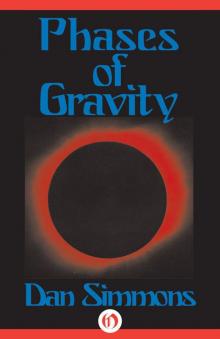 Phases of Gravity
Phases of Gravity Hardcase
Hardcase Fires of Eden
Fires of Eden Children of the Night
Children of the Night Muse of Fire
Muse of Fire Drood
Drood The Fifth Heart
The Fifth Heart Carrion Comfort
Carrion Comfort The Hollow Man
The Hollow Man Summer of Night
Summer of Night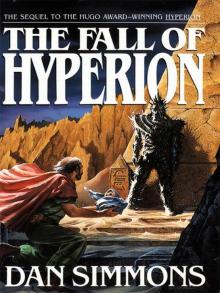 The Fall of Hyperion
The Fall of Hyperion Black Hills
Black Hills A Winter Haunting
A Winter Haunting Hard Freeze
Hard Freeze Prayers to Broken Stones
Prayers to Broken Stones Hard as Nails
Hard as Nails The Guiding Nose of Ulfant Banderoz
The Guiding Nose of Ulfant Banderoz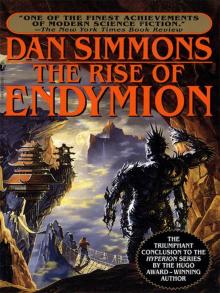 The Rise of Endymion
The Rise of Endymion Orphans of the Helix
Orphans of the Helix Lovedeath
Lovedeath Olympos
Olympos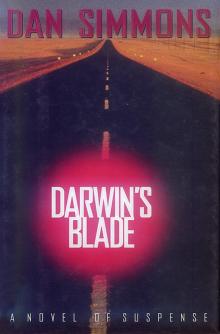 Darwin's Blade
Darwin's Blade Song of Kali
Song of Kali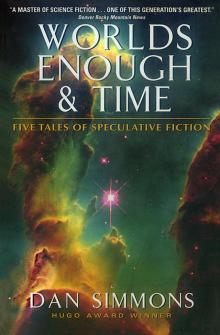 Worlds Enough & Time: Five Tales of Speculative Fiction
Worlds Enough & Time: Five Tales of Speculative Fiction The Abominable
The Abominable The Death of the Centaur
The Death of the Centaur Hard as Nails jk-3
Hard as Nails jk-3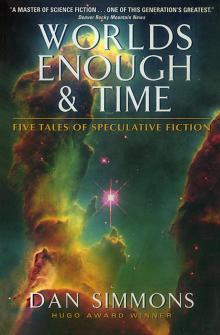 Worlds Enough & Time
Worlds Enough & Time Joe Kurtz Omnibus
Joe Kurtz Omnibus The Hyperion Cantos 4-Book Bundle
The Hyperion Cantos 4-Book Bundle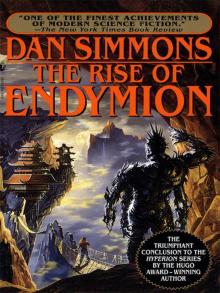 Rise of Endymion
Rise of Endymion Hard Freeze jk-2
Hard Freeze jk-2 Olympos t-2
Olympos t-2 The Abominable: A Novel
The Abominable: A Novel Hyperion h-1
Hyperion h-1 Remembering Siri
Remembering Siri Black Hills: A Novel
Black Hills: A Novel Ilium t-1
Ilium t-1 Hardcase jk-1
Hardcase jk-1 Hyperion 01 - Hyperion
Hyperion 01 - Hyperion